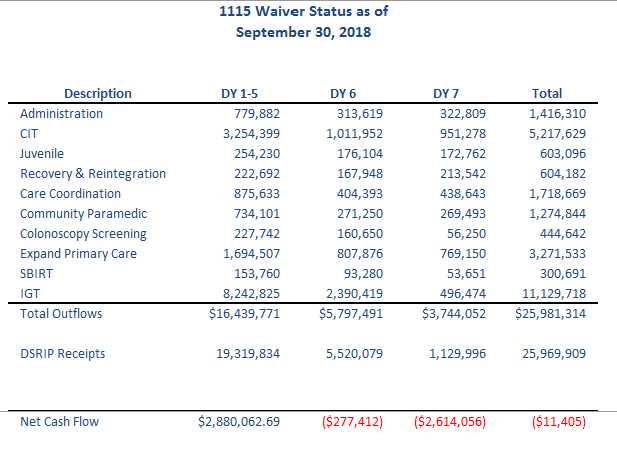
In 2011, the Centers for Medicare and Medicaid Services granted a Transformation Waiver to Texas. The increasing cost of healthcare services and the diminishing returns in terms of health improvement is across the board of health care in the United States, but even more so in the realm of government provided services. Texas applied for and received this waiver with five years of funding at $29 billion to transform the way care is provided for Medicaid eligible and uninsured patients, to improve population health, to improve the experience of care for the individuals and to reduce the cost of care.
Entities chose to participate in the waiver with two requirements: one - that they participate with a regional anchor (Harris Health is our Regional Healthcare Partnership 3) and two – that they put up funding in the form of an intergovernmental transfer (IGT) to commit to the program. The funding is provided in the following way:
The entity (Fort Bend County) determines the projects that it wants to participate in and the value of those projects in terms of cost savings, or health benefits to the population. The County makes available general revenue in the amount of approximately 42% of that value. The projects operate and strive to meet certain measurable goals. If those goals/benchmarks are met, the County receives the full 100% of the valuation and therefore has 58% of the valuation to actually operate the projects.
The current year of the waiver has changed the focus from individual projects to activities that improve health across a defined system of operation. Fort Bend County Health & Human Services and Fort Bend County Behavioral Health Services created a system of care that includes the Crisis Intervention Team, the Juvenile Diversion program, the Recovery and Reintegration program, the EMS service, the Immunization Clinics, the STD clinics, the TB Prevention and Control clinic and the local Federally Qualified Health Center, AccessHealth. Our core activities include Crisis Intervention and Stabilization for individuals with a mental health crisis, wrap around services for those coming out of jail to prevent recidivism, and similar services for juveniles to avoid reengagement with the juvenile criminal justice system. Other core activities include patients navigation and care coordination for individuals with chronic conditions to better manage their disease, home based care with community paramedics to avoid transportation via EMS to the emergency room, evaluation and intervention for substance use issues that may impact a patient’s ability to improve their health or follow a medical plan, provision of colonoscopy and other colorectal cancer screening for those without health insurance, and provision of additional medical staff at the FQHC to cover the referrals made by various 1115 Waiver programs in the area. The other entities with 1115 Waiver programs are Texana Center and OakBend Medical Center.
The programs are funded through September 2019, with anticipated lower levels of funding through 2021, although what those two years will consist of is not yet determined.
As of September accounting, the cash flow is as follows:
As of September 30, 2018 the County has sent in IGT amounts totaling $11,129,718 and has received $25,969,909 in incentive payments for a net amount of $14,840,191. Since we spent $14,851,596 through September 30th, the County has a negative cash flow to date of $11,405.
Reporting on the waiver achievements occurs in April and October. The October reporting will be paid in January and should result in a positive cash flow again.
